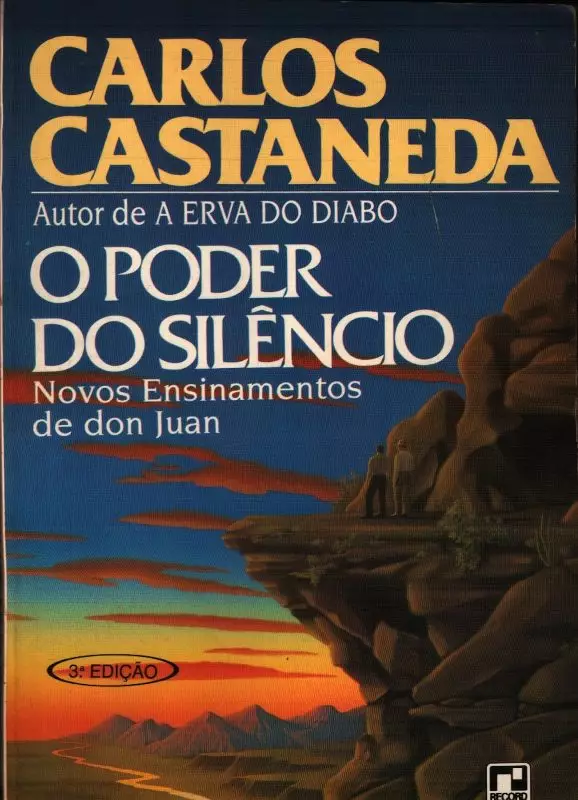We have briefly discussed in the previous issues of this journal the idea of Hermeneutics as a method of interpretation, the idea of the Phenomenological Method, and the idea of intentionality. I would like to outline now the possibility of a new area of philosophical inquiry. The elucidation of this topic is hinged on the definition of certain concepts that were developed by sorcerers or shamans who lived in Mexico in ancient times.
The first of such concepts, which is the cornerstone of sorcerers’ activities and beliefs, is called seeing. By seeing, sorcerers mean the capacity that, in their belief, human beings have to perceive energy as it flows in the universe. The claim that sorcerers make, which is substantiated by their practices, is that energy can be perceived directly as it flows in the universe, using our entire organism as a vehicle for perception.
Sorcerers make a distinction between the body as part of the cognition of our everyday life, and the entire organism as an energetic unit which is not part of our cognitive system. This energetic unit includes the unseen parts of the body, such as the internal organs, and the energy that flows through them. They assert that it is with this part that energy can be directly perceived.
Because of the predominance of sight in our habitual way of perceiving the world, sorcerers describe the act of directly apprehending energy as seeing. For sorcerers to perceive energy as it flows in the universe means that energy adopts non-idiosyncratic, specific configurations that repeat themselves consistently, and that can be apprehended in the same terms by anyone who sees.
The most important example of this consistency of energy in adopting specific configurations is the human body when it is perceived directly as energy. Sorcerers perceive a human being as a conglomerate of energy fields that gives the total impression of a clear-cut sphere of luminosity. Taken in this sense, energy is described by sorcerers as a vibration that agglutinates itself into cohesive units. They describe the entire universe as composed of energy configurations that appear to the seeing sorcerers as filaments, or luminous fibers that are strung in every which way, but without ever being entangled. This is an incomprehensible proposition for the linear mind. It has a built-in contradiction that can’t be resolved: how could those fibers extend themselves every which way and yet not be entangled?
Sorcerers, as unstudied practitioners of the phenomenological method, can only describe events. If their terms of description seem inadequate and contradictory, it is because of the limitations of syntax. Yet, their descriptions are as strict as anything can be. The luminous energetic fibers that make up the universe at large do extend themselves to infinity in every which way, and yet, they are not entangled. Each fiber is an individual, concrete configuration; each fiber is infinity itself.
In order to deal with these phenomena more adequately, perhaps it would be proper to construct an entirely different way of describing them. According to sorcerers, this is not at all a far-fetched idea, because perceiving energy directly is something that can be achieved by every human being. Sorcerers argue that this condition accords human beings the potential of reaching, through an evolutionary consensus, an agreement on how to describe the universe.
Another sorcerers’ concept that deserves close scrutiny in terms of this elucidation is something they call intent. They describe it as a perennial force that permeates the entire universe; a force that is aware of itself to the point of responding to the beckoning or to the command of sorcerers. The act of using intent they call intending. By means of intending, sorcerers are capable, they say, of unleashing not only all the human possibilities of perceiving, but all the human possibilities of action. They maintain that through intent, the most far-fetched formulations can be realized.
The limit of sorcerers’ capability of perceiving is called the band of man, meaning that there is a boundary that marks human capabilities as dictated by the human organism. These boundaries are not merely the traditional boundaries of orderly thought, but the boundaries of the totality of resources locked within the human organism. Sorcerers believe that these resources are never used, but are kept in situ by preconceived ideas about our limitations, limitations that have nothing to do with our actual potential.
The point that sorcerers present is that since perceiving energy as it flows in the universe is not arbitrary or idiosyncratic, seers witness formulations of energy that happen by themselves and are not a product of interpretation on our part. Sorcerers declare that the perception of such formulations is, in itself and by itself, the key that releases the locked-in human potential that never enters into play. Such formulations of energy, since they happen, by definition, independently of man’s volition intervention, are capable of creating a new subjectivity. Being cohesive and homogeneous for all human beings that see, these energy formulations are, for sorcerers, the source of a new intersubjectivity.
According to sorcerers, the subjectivity of everyday life is dictated by the syntax of our language. It necessitates guidelines, and teachers, who, by means of well-placed traditional commands that seem to be the product of our historical growth, begin to direct us, from the instant of our birth, to perceive the world. Sorcerers maintain that the intersubjectivity resulting from this syntax-guided rearing is, naturally, ruled by syntactical description-commands. They give as an example the statement, “I am in love,” a feeling which is shared intersubjectively by all of us, and which, they point out, is released upon hearing that description-command.
Sorcerers are convinced that, on the other hand, the subjectivity resulting from perceiving energy directly as it flows in the universe is not guided by syntax. It does not necessitate guidelines and teachers to point out this or that by commentary or command. The resulting intersubjectivity among sorcerers exists by means of something which they call power, which is the sum total of all the intending brought together by an individual. Since such intersubjectivity is not elicited through the aid of syntactical commands or solicitations, sorcerers claim that this subjectivity is a direct byproduct of the total human organism at work, fixed on one single purpose: intending direct communication.
In summation, intentionality or intending, for sorcerers, is the pragmatic utilization of intent, the force that expedites everything. For them, intent is a pragmatic channel for attainment, and intentionality is the means to use it. It is not merely, as it is with the philosophical discourse of the Western man, the intellectual account of the growth of human awareness from basic sensations to complex processes that can produce knowledge. Given that sorcerers are thoroughly pragmatic in their approach to life and living, intentionality is an active affair. It entails a posture on the part of sorcerers that they describe as a stand of power. From this stand, they can actually call intent. In this sense, intentionality becomes the completely conscious act of intending.
Sorcerers explain that these phenomena are actualized when the total human organism, in all its potential, is engaged in one single, all-inclusive purpose: intending.
Taking sorcerers’ capacity to perceive energy directly as a point of departure, it is possible to conceive a new area for philosophical discourse. The impediment to the realization of this possibility has been, so far, the lack of interest on the part of the sorcery practitioners in conceptualizing their knowledge and their practices. Sorcerers claim that after reaching certain thresholds of perception, which are like entrances into other realms of existence, the interest of practitioners is focused solely on the practical aspect of their knowledge.
Because of this bent towards pragmatism, sorcerers can seriously contemplate the transformation of philosophy and philosophical inquiry into a realm of practicalities by incorporating in it a more inclusive view of human potential. They consider that the direct perception of energy is then the usher that would lead us into a new subjectivity, free from syntax. Sorcerers propose that this new subjectivity is the way to reach intent, through the active process of intentionality.
(Carlos Castaneda, Journal of Applied Hermeneutics)

